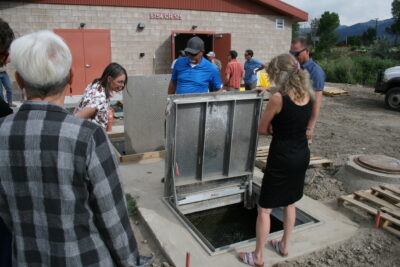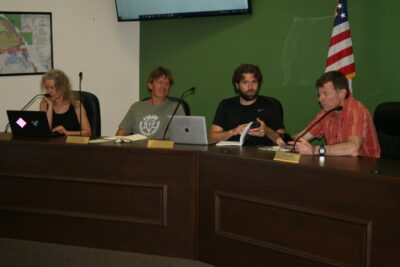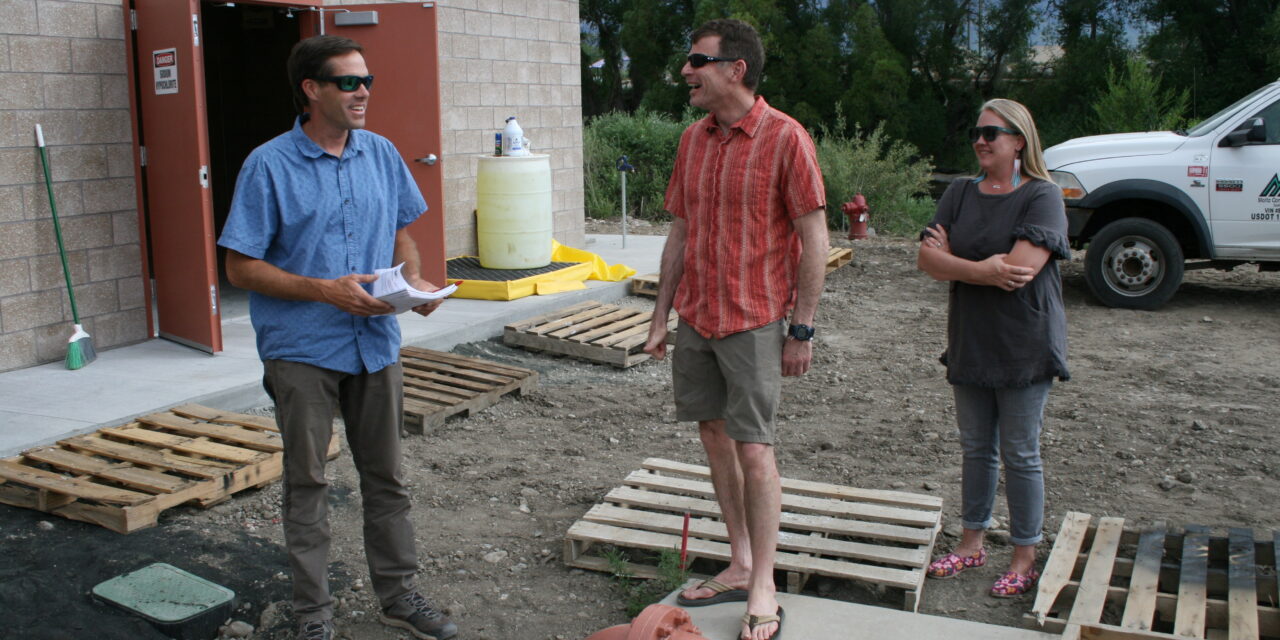The Salida City Council (SCC) work session on July 17 started off with a site tour of the Pasquale Springs Water Treatment Plant on CR 175. The tour was organized by City staff, including Public Works Director David Lady, P.E., as well as representatives of SGM Engineering and Moltz Construction. All were on hand to walk SCC members through the multi-million dollar makeover project, which included upgrades to the physical plant to insulate it for year-round operation, as well as new pumps, holding tanks, a safer disinfectant method and remote control and alarm systems.

Left to right: Council member Jane Templeton, Finance Director Aimee Tihonovich, SGS Engineer Bair, City Administrator Drew Nelson and council member Alisa Pappenfort peer into the overflow section of the new Pasquale Springs Water treatment plant in Salida. Merrell Bergin photo
The ultimate goal of the project, as City staff and SGM Senior Engineer Brandyn Bair, CWP explained, was to improve the City’s capacity and to plan for growth. “We are aiming for 50-year resiliency with this remodel, and planning for population growth in that time period of up to 16,000,” said City Administrator Drew Nelson.
The new system, which can treat and pump some 1,400 gallons of water per minute, will enable the City to take advantage of its full water rights, which allow for a two million gallon draw per day. “Right now,” Lady said, “the City of Salida uses about 3 million gallons of water per day. When this pump house is operating at full capacity, it alone will be able to provide about 2/3rds of Salida’s drinking water.”

SGS Engineer Brandyn Bair, Salida city staff and Moltz Construction team gather for a site visit to the new Pasquale Springs water treatment plant as Salida City Council member Harald Kasper (back to camera) looks on. Merrell Bergin photo
Nelson singled out Lady for praise, noting that he had had the Pasquale Springs project in the planning stages when Nelson first arrived nearly five years ago. Construction finally began around Labor Day in 2022, and is now virtually completed, with financing assisted by a combination of federal and state loans and grants.

Alisa Pappenfort, Harald Kasper, and Justin Critelli await fellow members of the Salida City Council as Mayor Dan Shore (right) consults the agenda. Merrell Bergin photo
Back in Council Chambers, the SCC then heard updates from Arts and Culture Department representatives on Salida’s Creative District strategic plan update.
Director Michael Varnum gave a history of Salida’s Creative District designation, starting in 2012 when Salida was the first Creative District so certified by Colorado Creative Industries (CCI), a division of the state’s Office of Economic Development and International Trade (OEDIT).
The certification is intended to promote creative arts and businesses as a vital part of Colorado’s economy. There are now numerous Creative Districts designated throughout the state. Varnum talked about past and current projects sponsored by the Creative District, and mentioned that the Creative District would be co-chairing the Salida ArtWalk next year with the Salida Council for the Arts.
After Varnum’s remarks, Arts and Culture Supervisor Patrick O’Brien outlined the goals in the new strategic plan, as well as the ways that Salida’s Creative District collaborates with others in the region in a “Creative Corridor” project, designed to spur serious art collectors, as well as tourists in general, to visit art galleries and sample arts and culture festivals in the participating communities. The Creative Corridor consist of Salida and five other mountain towns spread along 331 miles of Colorado scenic areas.
Community Engagement Coordinator Tina Gramann talked about various projects she was spearheading under the auspices of the Creative District, including new artist meet-ups, summer creativity camps for students, and the post-COVID resumption of “First Friday” events in the city’s art galleries.
Questions came from elected officials after the presentation. Treasurer Merrell Bergin asked, “What is your biggest constraint?” [when it comes to meeting strategic plan goals]. “Staffing, and budgeting for programs,” O’Brien replied.
Council member Harald Kasper asked about the tension between expectations for the city’s event venues – that generate revenue “to get as close to balanced budget as possible” – versus community programming that costs money. “[The Salida SteamPlant is] a venue, but we’re taking on more and more projects,” said Varnum. “[Arts and Culture is] closer to being like Parks and Recreation now – we have to provide venues. How many arts events/community events vs. how many paid events do we sponsor? Council needs to make a decision about how important programming is.”
“I would like feedback from Council,” said Kasper: “Are we OK with a redirection of events [at City venues] – from weddings to art events?”
“[Sales] tax dollars do offset programming,” said Nelson: “In terms of [the SteamPlant] paying for itself, I don’t think we rely on that as much as previous councils. That allows us to fund free events. The sales tax funds generated from events – all of that is viewed as part of the revenue pie. Revenues that do come from weddings and other events go into the pie as well. Revenues are blended together to cover the entire costs of arts programming. We have seen a rebound in revenues from the depths of the pandemic and we are always looking at it. [Arts and recreation programming] are not core services yet, but getting closer.”
“One thing that came out of COVID was learning how to live-stream events,” said Varnum. “We can do large conferences now [at the SteamPlant] because we now have the tech – we are now the venue of choice.”
At the conclusion of the meeting, Nelson thanked the SCC for coming out on the water plant site visit: “we need to have you do more of that.” He then mentioned that long-awaited work would start on Monday July 24 on asbestos mitigation at the condemned building at First and D Streets, which will be the future home of the ArtSpace live/work housing project. Demolition of the existing building is planned to begin the second week of August.
“We are getting concerns already,” Nelson noted: “But CDPHE (Colorado Department Public Health and Environment) will be monitoring the demo process to make sure it’s safe for area residents.”
Featured image: David Lady, P.E. Salida Public Works Director prepares to address Mayor Dan Shore and Assistant City Administrator Christy Doon as a site tour of Pasquale Springs water treatment plant gets underway. Merrell Bergin photo







Recent Comments